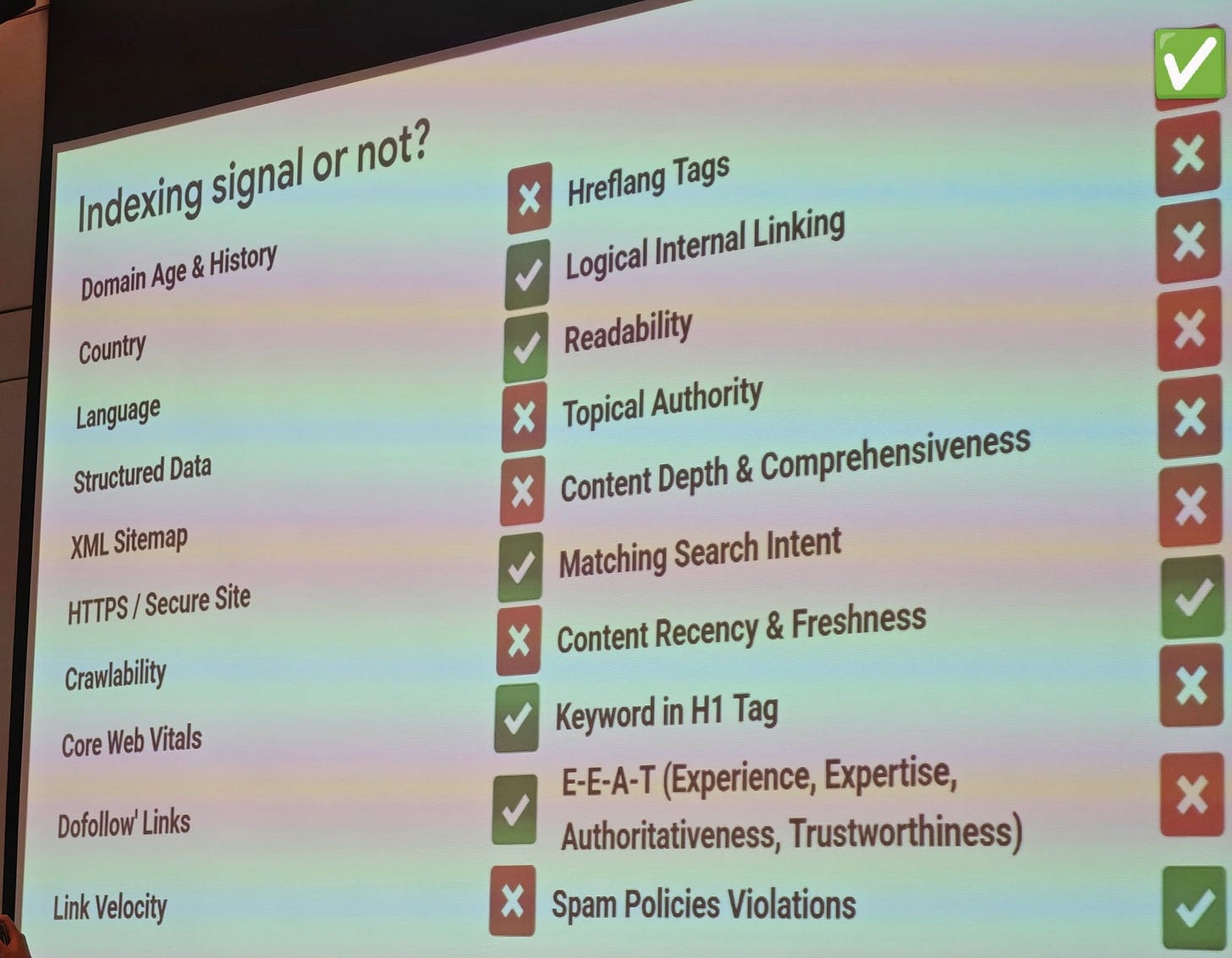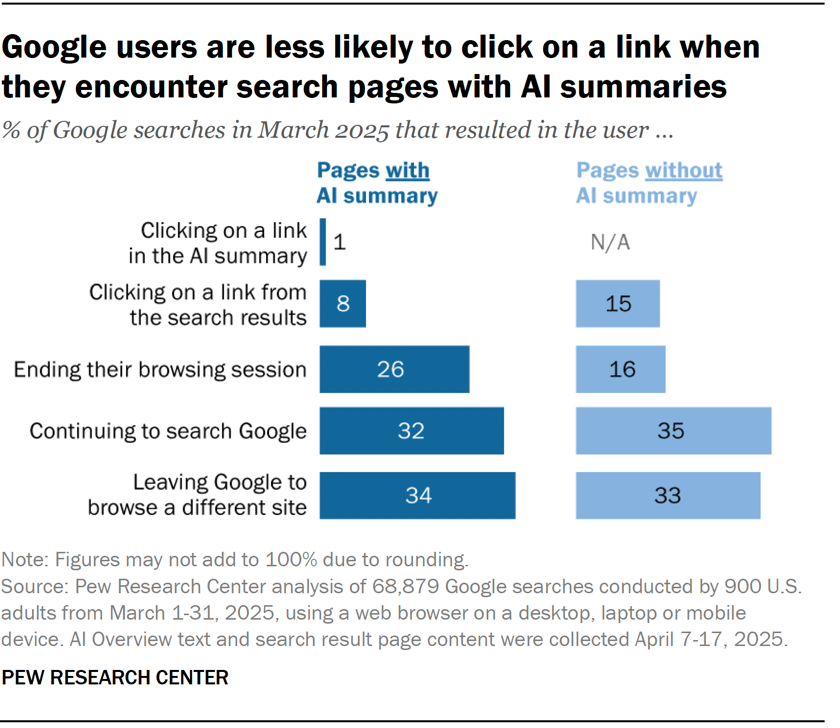Core Update Volatility, How CSS Affects SEO & The Case for LLMs.txt?
SEO TL;DR #79 28/07/2025
The keen-eyed among you may have noticed I took a week off. My excuse… the 6-week school holidays (only six weeks? I can hear my American readers weep).
Fear not, I’m back with the usual roundup of SEO news, covering all the essential updates from the past fortnight.
Core Update
Core Update Volatility Continues
Despite Google confirming that the June 2025 core update had been wrapped by July 17, the SERPs have remained volatile. The tools and chatter in Barry Schwartz’s roundup suggest ongoing traffic swings.
💡 Takeaway: This instability suggests there are unannounced changes layered on top. If you experienced a boost only to lose it again, assume nothing’s final and keep a close eye on GSC over the next week or two.
Content SEO
AI Overviews Cut Clicks
A new study from Pew Research has quantified the impact of Google’s AI Overviews on user behaviour and found that when AI Overviews appear in search results, only 8% of users click through to traditional links, compared to 15% when there’s no summary.
Worse still, just 1% clicked links within the AI Overview itself.
The report also noted that users were more likely to end their browsing session after seeing an AI Overview (26% vs. 16%), with longer, question-based queries more likely to trigger the feature. Wikipedia, Reddit and YouTube remain the most cited sources across both formats.
Google dismissed the findings, calling the methodology “flawed” and saying they haven’t observed a drop in aggregate web traffic. But with zero-click behaviour on the rise, and several other studies to back this up, the “great decoupling” between rankings and traffic is becoming more pronounced.
💡 Takeaway: If AI Overviews are suppressing clicks, then chasing rankings alone isn’t enough. Prioritise visibility strategies beyond Google: brand recall, content citations and featured mentions. If you're not building a reputation where AI summaries pull their facts from, you’re fighting a losing battle.
Technical SEO
What’s the Deal with /llms.txt
Despite Google’s Gary Illyes recently stating that “no AI system is currently using LLMs.txt”, it looks like OpenAI might be. As spotted by Ray Martinez, OpenAI has been crawling his llms.txt files every 15 minutes, suggesting it may be indexing or at least monitoring them.
Meanwhile, Google has doubled down on its indifference, confirming at Search Central Live that Google has no plans to support LLMs.txt. John Mueller also recommended noindexing the file to avoid confusing users who might stumble across it in search.
💡 Takeaway: Some AI platforms like Anthropic and ElevenLabs have published docs, but adoption across the industry is murky at best. Worse still, the proposed standard doesn’t link .md files back to canonical URLs, so if an LLM cites you, the link may lead to a raw markdown file, which is terrible for UX.
LLMs.txt might feel like a hopeful way to manage AI access, but it’s a mess right now: there is no standard, no clear adoption and zero benefit to publishers.
Technical SEO
Google on CSS and SEO
In a 40-minute deep dive, Google’s John Mueller and Martin Splitt unpacked how CSS interacts with SEO. While CSS doesn’t directly influence rankings like content or links, it can affect how pages are rendered, understood, and indexed.
The TL;DR:
CSS class names don’t impact SEO. Crawlers ignore them entirely.
Content added via ::before or ::after won’t be indexed, since it doesn’t exist in the DOM. Don’t use pseudo-elements for anything meaningful.
Viewport-based layouts (100vh) can confuse rendering tools, pushing content out of view and complicating debugging. Use
max-heightwhere appropriate.CSS background images aren’t indexed. Use
<img>tags for content images.Display: none still hides content from both users and crawlers. That hasn’t changed.
Don’t try to simulate tables with CSS. Use proper HTML table elements for real data.
💡 Takeaway: CSS should support content, not substitute it. If something matters for SEO (text, images, structure), it belongs in the HTML. Avoid hiding content with CSS or relying on tricks that don’t survive rendering. This is as much about accessibility and user experience as it is about search.
Watch the full episode below:
Technical SEO
Confirmed Indexing Signals
Indexing signals determine whether a page enters Google’s searchable database at all.
Ranking signals decide where it shows up.
Indexing is about eligibility. Ranking is about quality and relevance. This slide from Search Central Live breaks down some common indexing signals.

SEO X AI
Brand, AI & SEO with SEO for Hire
Last week, I had the honour of being involved in the first-ever SEO leadership panel by SEO for Hire, alongside some powerhouses of SEO (imposter syndrome, anyone?).
We covered how to future-proof your career against layoffs and AI, the shift from traffic to trust and how to balance AI-generated content with human nuance.
Watch us chat about all of this above, or in keeping with he episode, read the Notebook LM summary below in all of its bullet-pointed, italicised, emboldened, Americanised glory:
Key Strategic Shifts
Prioritize Collaboration: SEO must move beyond isolation. In-house teams need to collaborate with affiliate and paid teams. Agencies should form "freelance collectives" and work closely with client acquisition teams.
Rethink Data & Metrics: Expand data analysis beyond traditional rankings. Focus on referral traffic, impressions, and understanding the "entire landscape" of how your brand performs in both AI and traditional organic search. The goal should be driving leads and sales, not just vanity metrics like keyword rankings.
Understand AI's Data Pull: Analyze what information AI is pulling (e.g., bulleted lists, imagery) and whether it's copying or rewriting content, as 75-80% of AI overview citations are from page one results.
Essential Skills for the Future SEO
Adaptability & Experimentation: The industry is in a "primary school" phase, meaning everyone is learning, testing, and failing. This presents a huge opportunity for SEOs to be creative and experimental.
Technical Mindset & Automation: Entry-level SEO is shifting from "rote work" like updating title tags to building automations and handling technical components.
Human Touch & Creativity: AI won't replace your job, but "someone who's using AI will". AI tools free up time for SEOs to be more strategic and creative.
AI Content & Brand Integrity
Maintain Human Touch: Never simply copy and paste AI output; always ensure a "percentage of a human touch" to make content genuine and passionate.
Train AI on Your Brand: Feed AI tools your brand's tone of voice, demographic, and audience information. A suggested content split is 40% user proprietary knowledge, 30% provided documentation, and 30% AI's own knowledge base.
Brand is Perception: Brand is not just tone of voice; it's "how your audience is how others perceive you," requiring human-led decisions on "what are you going to be talking about for whom and how".
Ethical Considerations: Be aware of ethical dilemmas like manufacturing engagement on platforms (e.g., Reddit, Quora) to influence AI results. Some companies choose not to take this "prisoner's dilemma" risk.
Optimizing for AI Visibility
Track Brand Citations: Utilize tools if possible, or manually Google your brand, use NLP for sentiment analysis, and interact with LLMs like ChatGPT to see how they discuss your brand and competitors, pushing for source identification.
Gather first-party data from client questions, call transcripts, and industry forums to understand audience pain points, which provides a more accurate picture than keywords alone.
Advice for Leaders
Embrace Experimentation: For brands, "stop living off certainties" and "force that experimentation mindset". Don't wait for competitors; "be a pioneer" and "build as you go".
👋 Work With Me. I help e-commerce brands grow through technical SEO, smarter content and better UX. If you’re looking for support with a migration, audit or ongoing strategy, get in touch.



